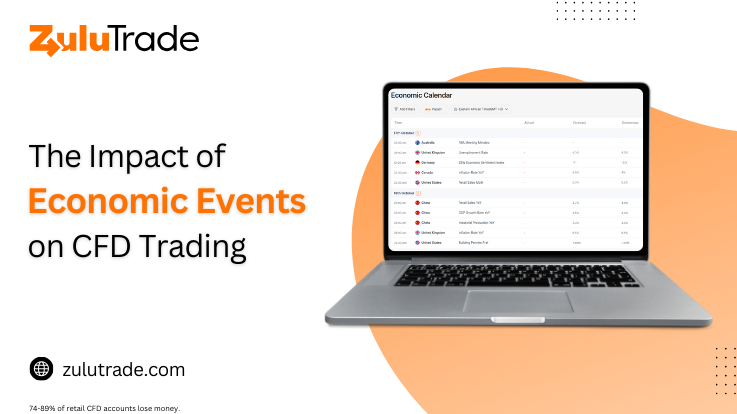
In the dynamic world of financial markets, where fortunes are made and lost with the click of a button, understanding the impact of economic events on CFD trading is paramount. At its core, the economy dictates how we produce, distribute, and consume goods and services. When there’s a notable shift or occurrence in this system, it’s referred to as an economic event. Much like how the weather can determine whether you spend the day outside or indoors, economic events are akin to the financial weather for traders. Their actions and decisions hinge upon the economic forecast and the events unfolding in the broader economy.
Moreover, when you’re trading, whether it’s video game cards or fancy stocks, there’s always something happening in the world that can change the game. For folks who trade in CFDs (those are Contracts for Difference), there are some big news events that can shake things up. Understanding these can be the difference between making a prudent move or missing an opportunity. So, let’s dive in and see how the world’s happenings can make a splash in the CFD pool!
What Are Economic Events?
Before we dive into the intricate relationship between economic events and CFD trading, it’s essential to establish a clear understanding of what these economic events are.
Economic events, in the context of financial markets, are significant occurrences or developments that can have a substantial impact on the global economy. These events can range from government policy changes and central bank decisions to economic data releases and geopolitical shifts. They are often accompanied by a flurry of news headlines and expert analyses, and they tend to generate heightened market volatility.
At the heart of these economic events are key indicators and data points that provide insights into the health and performance of a nation’s economy such as GDP, Interest rates, employment data, trade balances and much more.
Now, you might be wondering, “Why do these economic events matter to CFD trading?” So, fasten your seat belts as we embark on this enlightening journey through “The Impact of Economic Events on CFD Trading.”
Understanding the Impact of Economic Events on CFD Trading
When delving into the realm of Contract for Difference (CFD) trading, it is essential to comprehend how external economic events can influence the market dynamics. Much like the analogy of anticipating a surge in lemonade sales during a heatwave, financial markets react to economic events, sometimes with significant volatility. The impact of such events can be manifold. Let’s delve deeper into the intricacies of these influences.
1. Uncertainty:
- Volatility: Economic events, especially if unforeseen, can induce volatility in the market. Traders, being reactive to news, may make hurried decisions, either to capitalize on potential opportunities or to mitigate risks. This rush to make decisions can lead to a sudden and sharp movement in CFD prices.
- Market Sentiment: The collective feeling or mood of investors towards the market is known as market sentiment. Unexpected events can change this sentiment rapidly. For instance, an unforeseen political turmoil can sway traders towards a bearish sentiment, anticipating a market downturn, and consequently influencing CFD prices.
2. Supply and Demand:
- Influence on Production Capacity: Major economic announcements can have implications for a company’s production capacity. For example, news of a newly discovered resource can mean that a company can extract and produce more, influencing its stock value and, by extension, its CFD.
- Consumer Behavior: Economic events can influence consumer purchasing behavior. For instance, positive employment data might indicate more disposable income among consumers, which could lead to an increased demand for certain goods and services. Companies that cater to these demands might see an upward shift in their stock prices, and this is mirrored in CFD trading.
3. Big Decisions:
- Governmental Policies: Governments often make decisions about fiscal policies, regulations, interest rates, and trade relations. A decision to increase interest rates, for instance, might make borrowing more expensive, potentially slowing down consumer spending and business expansions. This can influence the stocks of companies and, in turn, affect CFD trading linked to those stocks.
- Macroeconomic Indicators: Elements such as Gross Domestic Product (GDP) growth, inflation rates, and unemployment rates can profoundly influence market sentiments. A country showing robust GDP growth might attract foreign investments, pushing up the value of its currency and stocks. Traders in CFDs linked to these assets would need to factor in these macroeconomic cues.
The impact of economic events on CFD trading is multifaceted. An adept trader keeps a vigilant eye on the global economic calendar and integrates these insights into their trading strategy. Being forewarned about potential market movers allows traders to be forearmed, positioning themselves advantageously in the dynamic world of CFD trading.
5 Major Events CFD Traders Should Look For
While learning about the impact of economic events on CFD Trading, here are five big events to keep an eye on:
- Central Bank Decisions: Just like a school principal making rules, central banks can set interest rates. This can make borrowing money cheaper or more expensive, and it’s one of the crucial factors discussed in “The Impact of Economic Events on CFD Trading”.
- Employment Reports: Jobs are important! If a lot of people are getting jobs, it’s a sign that things are going well.
Economic Summits: This is like a big meeting where leaders chat about money stuff. Decisions made here can be big news! - Natural Disasters: Sad but true, things like hurricanes or earthquakes can hurt businesses and change trading.
- Company News: If a big company shares some news – maybe they made a lot of money or had a problem – it can shake things up.
Wrapping Up!
So, there you have it! In the realm of CFD trading, our exploration into “The Impact of Economic Events on CFD Trading” underscores the vital importance of keeping a vigilant eye on global developments. Just like checking the weather before a picnic, CFD traders need to keep an eye on the world’s big events. Whether it’s a new job report or a big company’s news, these events can change the game. So, if you’re thinking of joining the CFD world, remember to stay informed and always be ready for a splash!
Frequently Asked Questions (FAQs)
What is the significance of market sentiment in CFD trading?
Market sentiment refers to the collective mood or attitude of traders towards the market. This sentiment can change based on various economic events, influencing traders’ decisions to buy or sell. A shift in sentiment can result in price fluctuations for CFDs, especially when unexpected economic events create either optimism or pessimism among traders.
How can governmental policies influence CFD prices?
Governmental decisions, such as changes in fiscal policies, regulations, interest rates, or trade relations, can directly affect the economy and companies’ performances. For example, an interest rate hike might reduce consumer spending and business expansions, potentially leading to a downturn in stock prices. Since CFD trading involves speculating on these price changes, any major governmental decision can impact CFD prices accordingly.
Why is it important for CFD traders to monitor macroeconomic indicators?
Macroeconomic indicators like GDP growth, inflation rates, and unemployment rates provide insights into a country’s economic health. Strong GDP growth, for instance, might attract foreign investments, raising the value of a country’s currency and stocks. As CFDs derive their value from underlying assets, being updated on these indicators helps traders make informed decisions on potential price movements.
How does consumer behavior impact CFD trading?
Economic events can shape consumer purchasing habits. Positive economic indicators, like good employment data, might signal an increase in consumer spending. This can lead to a rise in demand for certain goods and services, influencing the stock prices of companies catering to these demands. Since CFD prices reflect these underlying stock price movements, changes in consumer behavior can significantly influence CFD trading.
